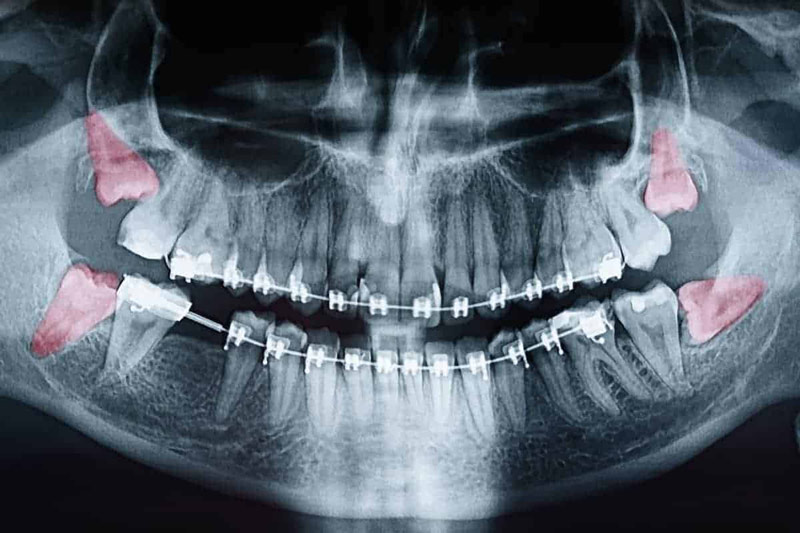Wisdom Teeth Extractions
Wisdom Teeth
By the age of 18, the average adult has 32 teeth; 16 teeth on the top and 16 teeth on the bottom. Each tooth in the mouth has a specific name and function. The teeth in the front of the mouth (incisors, canine, and bicuspid teeth) are ideal for grasping and biting food into smaller pieces. The back teeth (molar teeth) are used to grind food up into a consistency suitable for swallowing. The average mouth is made to hold only 28 teeth. It can be painful when 32 teeth try to fit in a mouth that holds only 28 teeth. These four other teeth are your third molars, also known as “wisdom teeth.”

Why Should I Have My Wisdom Teeth Removed?
Though some patients may not require the removal of their wisdom teeth, most often, it is needed to protect your overall oral health. Wisdom teeth can begin to grow in sideways, only partially erupt, or even get stuck beneath the gum and bone. Known as impacted teeth, those that get stuck may resort to shifting position as the try to find a pathway for eruption into the mouth. When wisdom teeth don’t erupt and align properly, they can create severe problems for the patient, including:
- Risk of infection in tissues surrounding the tooth.
- Disruption to the corrective orthodontic or natural alignment of teeth.
- Formation of tumors or cysts around impacted wisdom teeth, resulting in jawbone or adjacent tooth destruction.

Oral Examination
With an oral examination and x-rays of the mouth, Drs. Schultz, Perciaccante, Anderson, and Keyser can evaluate the position of the wisdom teeth and diagnose present problems or predict if future problems may develop. Studies have shown that early evaluation and treatment results in a superior outcome for the patient and minimizes risk to vital structures and adjacent teeth. Patients are generally first evaluated in the mid-teenage years by their dentist, orthodontist or by one of our highly trained oral and maxillofacial surgeons.
All outpatient surgery is performed under appropriate anesthesia to maximize patient comfort. Drs. Schultz, Perciaccante, Anderson, and Keyser have the unique training, licensing, and experience to provide various types of anesthesia for patients to achieve the best surgical outcome.
Wisdom Teeth Extractions in Newnan, Peachtree City and Fayetteville
During your consultation visit, we will discuss the various forms of anesthesia we may use during your procedure as well as any risks involved. Our primary goal is to ensure your comfort.
The removal of wisdom teeth will be performed under local anesthesia, laughing gas (nitrous oxide/oxygen analgesia) or general anesthesia. These options, as well as the surgical risks (i.e., sensory nerve damage, sinus complications), will be discussed with you before the procedure is performed.
Once the teeth are removed, the gum tissue is sutured. You will rest under our supervision in the office until you are ready to be taken home. Upon discharge, your postoperative kit will include postoperative instructions, prescriptions for pain medication, antibiotics, and a follow-up appointment in one week to ensure you are healing properly.
Call Us Today to Schedule Your Appointment
We take pride in making the entire process as streamlined as possible. The longer you wait to extract impacted wisdom teeth, the more discomfort they can cause, and the more difficult the procedure becomes. Contact our office today for a consultation to discuss removal of your wisdom teeth.
